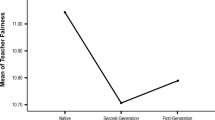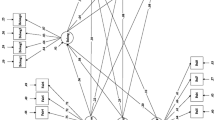Abstract
The aim of this study was to examine the roles of sense of belonging and gender in the academic outcomes of urban, Latino adolescents. It was expected that sense of belonging would play a different role in males' and females' academic adjustment. Participants (N = 143) included mostly Mexican and Puerto Rican seniors from a large, urban high school. The academic outcomes assessed were grade point average, absenteeism, motivation, effort, and educational aspirations and expectations. As hypothesized, females consistently had more positive academic outcomes than males. Sense of school belonging significantly predicted academic outcomes, including academic motivation, effort, and absenteeism. Regression analyses did not show that gender explained differences in the relationship between sense of belonging and academic outcomes. Implications and future directions for research on urban Latino males and females are discussed.
Similar content being viewed by others
References
Atkinson, J. (1964). An Introduction to Motivation. Van Nostrand, Princeton, NJ .
Baumeister, R. F., and Leary, M. R. (1995). The need to belong: Desire for interpersonal attachments as a fundamental human motivation. Psychol. Bull. 117(3): 497–529.
Dewey, J. (1958). Experience and Education. MacMillan, New York.
Eccles, J., Adler, T., Futterman, R., Goff, S., Kaczala, C., Meece, J., and Midgley, C. (1983). Expectancies, values, and academic behaviors. In Spence, J. (ed.), Achievement and Achievement Motives. Freeman, San Francisco, pp. 78–147.
Eccles, J. S., Midgley, C., and Adler, T. F. (1984). Grade-related changes in the school environment: Effects on achievement motivation. In Nicholls, J.G. (ed.), The Development of Achievement Motivation. JAI, Greenwich, CT.
Eccles, J. S., Midgley, C., Wigfield, W. D., Buchanan, C. M., Reuman, D., Flannigan, C., and MacIver, D. (1993). Development during adolescence: The impact of stage environment fit on young adolescents' experiences in schools and in families. Am. Psychol. 48: 90–101.
Fine, M. (1991). Framing Dropouts: Notes on the Politics of an Urban Public High School. State University of New York, Albany.
Gilligan, C. (1982). In a Different Voice: Psychological Theory and Women's Development. Harvard University Press, Cambridge, MA.
Gonzalez, R., and Padilla, A. M. (1997). The academic resilience of Mexican American high school students. Hispanic J. Behav. Sci. 19(3): 301–317.
Goodenow, C. (1993a). Classroom belonging among early adolescent students: Relationships to motivation and achievement. J. Early Adolesc. 12(1): 21–43.
Goodenow, C. (1993b). The psychological sense of school membership among adolescents: Scale development and educational correlates. Psychol. Sch. 30: 79–90.
Goodenow, C., and Grady, K. E. (1993). The relationship of school belonging and friends' values to academic motivation among urban adolescent students. J. Exp. Educ. 62(1): 60–71.
Grolnick, W. S., and Ryan, R. M. (1989). Parent styles associated with children's self‐regulation and competence in school. J. Educ. Psychol. 81(2): 143–154.
Hagborg, W. (1998). An investigation of a brief membership of school membership. Adolescence 33(130): 461–466.
Lewis, A. (2003). Race in the Schoolyard: Negotiating the Color Line in Classrooms and Communities, Piscataway, NJ, Rutgers University Press.
López, E. J., Ehly, S., and Garcia-Vázquez, E. (2002). Acculturation, social support, and academic achievement of Mexican and Mexican American high school students: An exploratory study. Psychol. Sch. 39(3): 245–257.
López, N. (2002). Rewriting race and gender high school lessons: Second-generation Dominicans in New York City. Teach. Coll. Rec. 104(6): 1187–1203.
Marín, G., and Marín, B. V. O. (1991). Research with Hispanic populations. Applied Social Research Methods Series, 23. Sage, London.
Marin, G., and Triandis, H. C. (1985). Allocentrism as an important characteristic of the behavior of Latin Americans and Hispanics. In Diaz-Guerrero, R. (ed.), Cross-cultural and National Studies in Social Psychology. Elsevier Science, Amsterdam, pp. 85–104.
Matute-Bianchi, M. E. (1991). Situational ethnicity and patterns of school performance among immigrant and nonimmigrant Mexican-descent students. In Gibson, M. A., and Ogbu, J. (eds.), Minority Status and Schooling: A Comparative Study of Immigrant and Involuntary Minorities. Garland, New York.
McMillan, D. W., and Chavis, D. M. (1986). Sense of community: A definition and theory. J. Community Psychol. 14: 6–23.
Murdock, T. B., Anderman, L. H., and Hodge, S. A. (2000). Middle-grade predictors of students' motivation and behavior in high school. J. Adolesc. Res. 15(3): 327–351.
Osterman, K. F. (2000). Students' need for belonging in the school community. Rev. Educ. Res. 70(3): 323–367.
Pintrich, P. R., and De Gnest, E. V. (1990). Motivational and self-regulated learning components of classroom academic performance. J. Educ. Psychol. 82(1): 33–40.
Qin-Hilliard, D. B. (2004). Segmented adaptation: Understanding the role of gender in immigrant students' educational experiences and expectations. In Todorova, I. L. G. (Chair), Social and Academic Adaptation of Immigrant Youth. Paper symposium presented at the Biennial Meeting of the Society for Research on Adolescence, Baltimore, MD.
Reyes, O., Gillock, K., and Kobus, K. (1994). A longitudinal study of school adjustment in urban minority adolescents: Effects of a high school transition program. Am. J. Community Psychol. 22(3): 341–369.
Roeser, R., Midgley, C., and Urdan, T. C. (1996). Perception of the school psychological environment and early adolescents' psychological and behavioral functioning in school: The mediating role of goals and belonging. J. Educ. Psychol. 88(3): 408–422.
Rong, X. L., and Brown, F. (2001). The effects of immigrant generation and ethnicity on educational attainment among young African and Caribbean Blacks in the United States. Harv. Educ. Rev. 71(3): 536–565.
Saunders, S., Davis, L., Williams, T., and Williams, J. H. (2004). Gender differences in self-perceptions and academic outcomes: A study of African American high school students. J. Youth Adolesc. 33(1): 81–90.
Smerdon, B. (2002). Students' perceptions of membership in their high schools. Sociol. Educ. 75(4): 287–305.
Stevens, C. J., Puchtell, L. A., Ryu, S., and Mortimer, J. T. (1992). Adolescent work and boys' and girls' orientations to the future. Sociol. Q. 33(2): 153–169.
Triandis, H. C., McCusker, C., and Hui, C. H. (1990). Multimethod probes of individualism and collectivism. J. Pers. Soc. Psychol. 59: 1006–1020.
U.S. Department of Education, NCES. (2005). The condition of education 2005. NCES 2005-094, Washington, D.C.: U.S. Government Printing Office.
Valdez, V., and Rodriguez, J. E. (2002). Statistics for Latino Majority Schools in the Chicago Public Schools: Part 1. Chicagoland Latino Educational Research Institute, Chicago, IL.
Valenzuela, A. (1999). Subtractive Schooling: U.S. Mexican Youth and the Politics of Caring. State University of New York Press, Albany, NY.
Wojtkiewicz, R. A., and Donato, K. M. (1995). Hispanic educational attainment: The effects of family background. Soc. Forces 74(2): 559–574.
Author information
Authors and Affiliations
Corresponding author
Rights and permissions
About this article
Cite this article
Sánchez, B., Colón, Y. & Esparza, P. The Role of Sense of School Belonging and Gender in the Academic Adjustment of Latino Adolescents. J Youth Adolescence 34, 619–628 (2005). https://doi.org/10.1007/s10964-005-8950-4
Received:
Revised:
Accepted:
Issue Date:
DOI: https://doi.org/10.1007/s10964-005-8950-4




